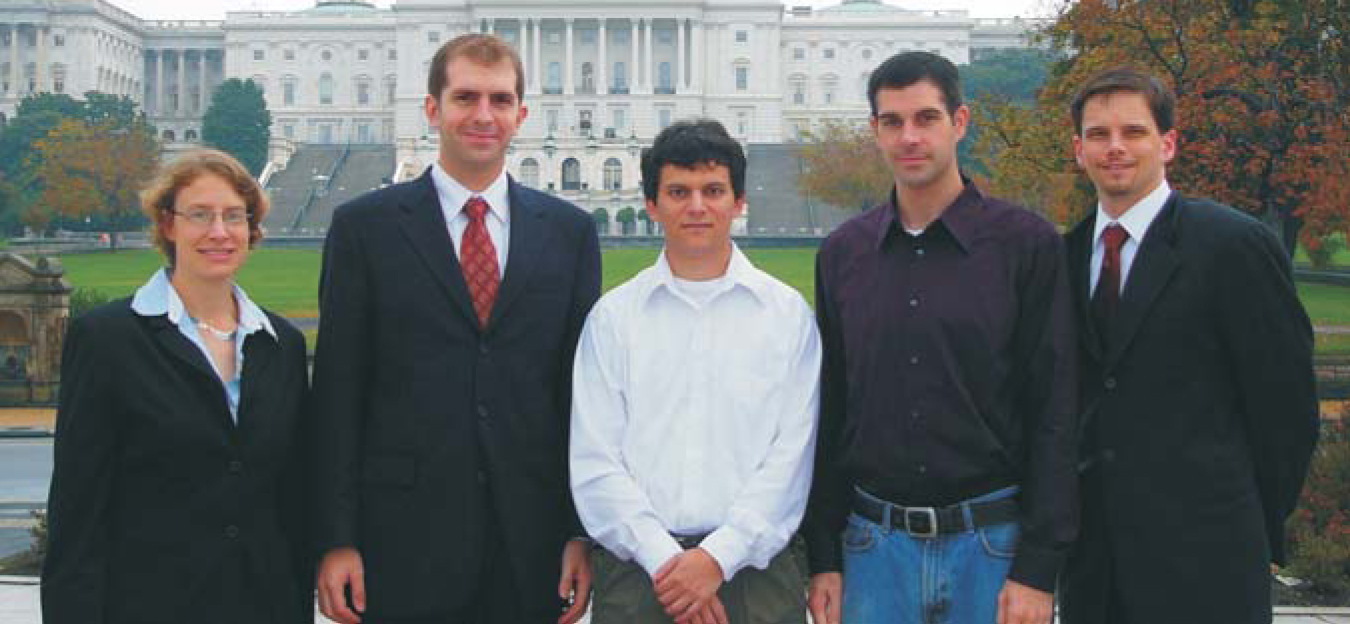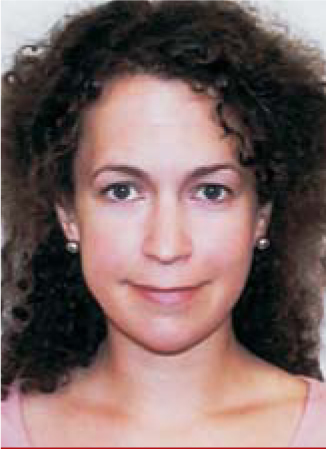Congressional fellows bridge science and policy
DOI: 10.1063/1.2435676
“I have to immediately become an expert on whatever issue comes up,” says Donald Engel, this year’s congressional fellow for the American Physical Society (APS). Engel is working as a staffer for Representative Rush Holt (D-NJ). “I work on math and science education, and on Einstein’s alley”—a project to promote science and technology industry in New Jersey, he says. Engel, who last spring completed his PhD on computational protein design at the University of Pennsylvania, first heard about the fellowships as a college freshman in a course on careers in physics. “It has been in my head that I wanted to apply since then,” he says.
Engel is one of about 140 new science and technology policy fellows spending a year in the offices of the US Congress and in executive branch agencies through a program organized by the American Association for the Advancement of Science. The American Institute of Physics sponsors a fellow in the State Department (see the story on page 36), and AIP and some of its member societies sponsor a half dozen congressional fellows. Fellows attend a nine-day crash course on the legislative and executive branches of government. Then they step into the best fit they can find in an agency, Senate or House office, or congressional committee.
The science person
Kevin Whittlesey, this year’s fellow for the Optical Society of America (OSA) and the Materials Research Society (MRS), was a fellow last year at the National Academy of Sciences (NAS). “I got a snapshot of the science policy landscape, and the bug bit me,” he says. Whittlesey earned his PhD in 2005 at Northwestern University for research in neural tissue engineering. When he first came to Washington, he says, “I wasn’t sure whether I would encounter refugees from the lab who were burned out on science. What I found was a lot of really intelligent PhDs, many of them very much into science, but they wanted to be more actively engaged in the decision making that affects all of us.” Whittlesey joined the office of Rep. Doris Matsui (D-CA) because, he says, “House staffs are usually about 10 people. Senate staffs can be 50. So in a House office, as opposed to having a subset of science issues, you are the science person.”
This year’s AIP fellow is Jonna Hamilton, whose 2006 PhD from Brown University focused on how puffins use their wings to both swim and fly. She is working on energy and environment issues in the office of Senator Richard Durbin (D-IL). “I love academics, and I love science, but [doing my research] I felt like I wasn’t doing anything that mattered in the broader scheme of things,” she says. “Here, I get to use my scientific training to influence policy in a positive way.”
In choosing to work for Sen. Christopher Dodd (D-CT), Mark Wenzel, this year’s fellow for the American Geophysical Union, looked for “politics, personality, and portfolio.” When Physics Today spoke with him, Wenzel, who holds a 2006 PhD in Earth and planetary sciences from the University of California, Berkeley, had just joined Dodd’s office and expected to work on defense procurement, energy and the environment, and competitiveness.
Eleanore Edson, this year’s fellow sponsored by OSA and the International Society of Optical Engineering (SPIE), came to the office of Sen. Hillary Clinton (D-NY) from a fellowship at the NAS. As a graduate student in neurobiology at Harvard University, she says, “I realized I wanted to have a career that addressed the big picture of numerous scientific issues—as opposed to the minutiae of one particular research area.” As a Clinton staffer, Edson’s purview is aging, substance abuse, mental health, and military health issues. “I meet with constituents. I attend meetings and seminars. And a lot of my job is to find support for legislation that is still pending and to work on new legislation ideas,” she says.
Alex Saltman is working on arms control, energy, and the environment in the office of Rep. Adam Schiff (D-CA) and, like Engel, is sponsored by APS. Saltman earned his PhD in string theory this past summer from Stanford University. He came to Washington “to do something socially useful” and says he is “undecided about whether to go back to academia or stay in policy.” But, he adds, “it seems that we scientists are in big demand here [in Washington].”
Potomac fever
Over the years, roughly a third of congressional fellows have stayed in policy, a third have returned to academia, and a third have struck out in new directions. Most of last year’s fellows have stayed in the Washington area, at least for now.
Two 2005-06 congressional fellows—Jamie Link, sponsored by OSA and SPIE, and Vivek Mohta, sponsored by APS—have jobs at the Science and Technology Policy Institute in Alexandria, Virginia, doing research related to US competitiveness and innovation and the effective allocation of federal R&D spending. Josh Trapani, last year’s AGU fellow, has a fellowship as a policy analyst at the USDA Forest Service. Trapani says he may still return to academia. Being a congressional fellow, he says, “is an intense educational experience. Everything moves fast. Getting things done by deadline was more important than getting them done perfectly. And I learned that science has an important role to play in policy, but it’s just one piece. It’s about negotiating between a whole lot of things, and to have science trump everything else doesn’t make sense.”
Benjamin Gross, last year’s fellow for OSA and MRS, is the only one of the bunch to have left Washington. Now job hunting in San Francisco, he says he would like to work in the technology sector doing product management or consulting. “One of the blessings and curses of the congressional experience is that I have almost too many options in terms of career paths I could pursue.” Science policy and politics, Gross adds, are “addictive. People talk about Potomac fever. It’s hard to put down.”

Congressional fellows sponsored by physics societies this year include, from left: Jonna Hamilton, Donald Engel, Alex Saltman, Kevin Whittlesey, and Mark Wenzel.


Edson

More about the authors
Toni Feder, American Center for Physics, One Physics Ellipse, College Park, Maryland 20740-3842, US . tfeder@aip.org





